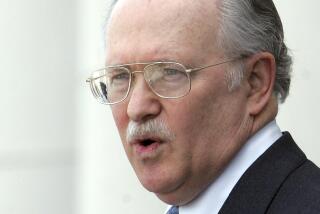Alabama governor’s remarks on non-Christians raise eyebrows
- Share via
Reporting from Atlanta and Los Angeles — On the day of his swearing-in, Alabama Republican Gov. Robert J. Bentley raised concern among the state’s non-Christians by declaring that people who had not accepted Jesus Christ were not his brothers and sisters.
Speaking to a large crowd Monday at Montgomery’s Dexter Avenue King Memorial Baptist Church — where the Rev. Martin Luther King Jr. once preached — Bentley said that “if you’re a Christian and you’re saved ... it makes you and me brother and sister,” according to a report in the Birmingham News.
“Now I will have to say that, if we don’t have the same daddy, we’re not brothers and sisters,” he added, according to the paper. “So anybody here today who has not accepted Jesus Christ as their savior, I’m telling you, you’re not my brother and you’re not my sister, and I want to be your brother.”
By Tuesday, the comments were reverberating beyond Alabama. David Silverman, president of Cranford, N.J.-based American Atheists, called the remarks “outrageous.”
“He is a governor, not a mullah,” Silverman said. “This is a diverse nation with a secular government. If he doesn’t like it, he shouldn’t be governor.”
Bentley, 67, a retired dermatologist, had been sworn in earlier Monday, replacing two-term Republican Gov. Bob Riley. The new governor is a Sunday school teacher and deacon at Tuscaloosa’s First Baptist Church, which considers “passionately” evangelizing to be a “key core value,” according to its website.
During remarks on the steps of the state Capitol, Bentley declared himself “governor of all of Alabama — Democrat, Republican and independent, young and old, black and white, rich and poor.”
Those initial comments had been heartening to Ashfaq Taufique, president of the Birmingham Islamic Society. But the later comments, he said, were “quite disturbing and contrary to what I read earlier.”
“He was saying that for us to be considered equal, we would have to become Christians in his brand of understanding,” Taufique said. “I’m hoping that he was just in a Baptist church and he wanted to please his congregation, forgetting his earlier comment to be governor of all Alabamians.”
Richard Friedman, executive director of the Birmingham Jewish Federation, said such comments “tend to disenfranchise those of a different religious view.”
“You know, it’s a recurring theme in Alabama,” said Friedman, who said the state, with a population of about 4.7 million, is home to an estimated 10,000 Jews. “One of the things we have to do is continue to sensitize our leaders to the fact that there are non-Christians in this state, and encourage them whenever possible to be sensitive to that.”
Bentley was raised in Columbiana, a small town in rural Shelby County, the son of a sawmill worker. He was first elected to the Alabama state House of Representatives on a platform of fiscal conservatism and family values.
His staff did not return a phone call seeking comment Tuesday.
Gil McKee, senior pastor of Tuscaloosa’s First Baptist Church, said the new governor “was in no way meaning to be offensive to anyone.”
“He was coming strictly from the fact that Scripture talks about how those that know Jesus Christ as their savior are adopted into the family of God, and as we are adopted into God’s family, we are adopted into the family of Christ,” McKee said.
The Birmingham Jewish Federation announced Tuesday that it would assemble a delegation of Jews and Christians that would try to meet with the governor “as soon as possible to initiate a dialogue.”
Friedman, the longtime head of the federation, said the Jewish community was generally comfortable in the Southern state — but that such things happen from time to time, things he characterized as “only in Alabama” moments.
“These folks typically don’t mean any harm at all,” Friedman said. “It never occurs to them that they’re saying anything that would make others uncomfortable. They’re simply motivated by their passion for their own religious faith.”
Tenzen Deshek, a lama at the Losel Maitri Tibetan Buddhist Center in Birmingham, gave a good-natured chuckle Tuesday when asked whether he took offense at the comments. “You know,” Deshek said, “although he’s the governor, he can’t change people’s minds.”
More to Read
Sign up for Essential California
The most important California stories and recommendations in your inbox every morning.
You may occasionally receive promotional content from the Los Angeles Times.














